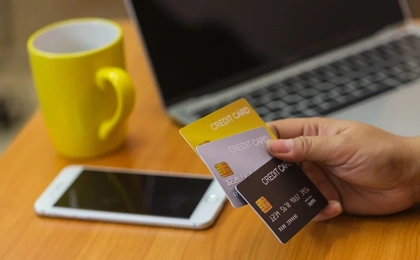Have you ever wondered how your credit card collection compares to everyone else's? Whether you're someone who keeps just one card in your wallet or you've got a few different ones for various needs, you're probably curious about what's "normal" when it comes to credit cards.
Let's dive into the numbers and see exactly how many credit cards the average person in the UK actually has.
The average person in the UK has between 1.3 and 1.7 credit cards
That might sound quite specific, but different studies show slightly different numbers depending on how they count things.
Here's what we know for sure:
But here's the thing - averages can be a bit misleading. The reality is that some people have no credit cards at all, while others might have three, four, or even more cards in their wallet.
How credit card ownership varies
Credit card ownership isn't the same for everyone. Here's how different groups compare:
Age makes a big difference - People aged 65-74 are most likely to have a credit card (78%), while only 29% of 18-24 year olds have one. This makes sense as younger people are still building their credit history.
Your job matters - Employed people are twice as likely to own a credit card. 69% of employed people have one compared to just 35% of unemployed people.
Income plays a huge role - 80% of households earning £50k+ have a credit card, but only 40% of those earning under £15k do. Higher earners find it easier to get approved and access better deals.
Homeowners vs renters - About 8 out of 10 homeowners have a credit card, compared to around half of renters. This likely reflects income differences between the two groups.
Small gender gap - Men are slightly more likely to own a credit card (68%) than women (61%).
Why do people have multiple credit cards?
There are lots of good reasons why someone might choose to have more than one credit card:
Different rewards and benefits - You might have one card that gives you cashback on groceries and another that earns points on petrol purchases.
Balance transfers - People often get a new card with a 0% interest rate to transfer debt from an older, higher-interest card.
Backup options - Having a second card means you're not stuck if your main card gets declined or lost.
Credit building - Some people start with a basic card and then add cards with better deals as their credit score improves.
Specific purposes - You might have one card for everyday spending and another just for big purchases or emergencies.
How many credit cards is too many?
There's no magic number when it comes to "too many" credit cards, but there are some warning signs to watch out for. You might have too many cards if you’re:
- struggling to keep track of payment dates
- finding it hard to remember which cards you have
- missing payments, or owing more than you can afford.
Most financial experts suggest that if you can't comfortably manage all your cards - meaning you know the balances, payment dates, and terms for each one - then you probably have more than you need. It's also worth considering whether each card serves a genuine purpose in your financial life.
What to do if you think you have too many credit cards
If you feel like you’ve got more cards than you can manage, the key is to simplify. Here are some steps that could help:
- Take stock of what you’ve got – Write down every card, including balances, limits, interest rates, and payment dates. This will show you which ones are costing you the most.
- Tackle expensive debt first – Prioritise paying off the cards with the highest interest rates, as these are the most expensive to keep.
- Think about consolidation – If juggling multiple payments feels stressful, you could combine your credit card debts into one place. For example, a personal loan or a balance transfer card could help you move everything into a single monthly payment.
- Use balance transfers wisely – Many providers offer 0% interest for a set period when you transfer your balance from another card. This can give you breathing space to pay down what you owe faster. Just watch out for transfer fees and make sure you clear the balance before the 0% period ends.
- Close cards that don’t serve a purpose – If you’re paying annual fees for a card you never use, or if it doesn’t fit your needs anymore, closing it might make sense. Just be mindful it could slightly affect your credit score.
- Keep the useful ones – It’s fine to hold onto one or two cards if they give you genuine benefits, like rewards, cashback, or a reliable backup option.
The goal is to make managing your money easier, not harder. If you’re feeling stretched, consolidation or balance transfers could simplify things and save you money at the same time.
So, how many is right for you?
Your circumstances will shape what works best for you, and that's perfectly normal. Whether you're just starting out with credit or you're managing multiple cards, you're part of a diverse mix of people all doing what makes sense for their own financial situation.
Fiona is a personal finance writer with over 7 years’ experience writing for a broad range of industries before joining Ocean in 2021. She uses her wealth of experience to turn the overwhelming aspects of finance into articles that are easy to understand.
Find this useful? Share it with others!










